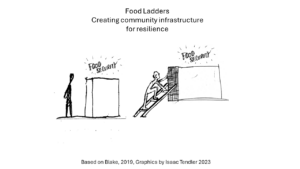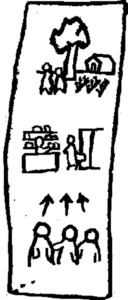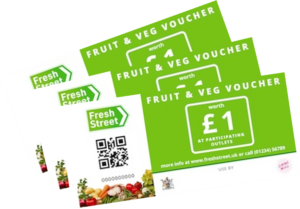Food Ladders
The experience of food insecurity diminishes food choices, and healthy foods, such as fruit and vegetables become unattainable. But everyday food insecurity is more than just a lack of access to food based on income. Food insecurity and poverty produces landscapes where the availability of good food and the social connections it enables are scarce.
Scarce foodscapes reduce the resilience of places and people by producing want, poor health, and social isolation.

Food Ladders is an evidenced-based approach for framing food-based interventions and tool for community-based development that focuses on reducing vulnerability to food insecurity.

There are three Food Ladder rungs.
1: Catching for those in crisis, e.g. emergency food aid, to cope with shock, job loss, debt, illness, relationship breakdown etc.

2: Capacity building and local asset enhancement for those struggling to afford/ access food, e.g., food pantries, voucher schemes.

3: Self-organised community change to enable progressive and socially just transformations in food systems, health, wellbeing and community cohesion, e.g., cooperative food growing, community markets, social enterprise.

Fresh Street is a community-scale intervention for increasing fruit and vegetable consumption and building local food system resilience.

Fresh Street is a place-based scheme that supports all households regardless of size or income and with no requirement to prove need. Households can share the paper vouchers. Vouchers are redeemable only with local (non-supermarket) fruit and vegetable suppliers.

These features combined enable the scheme to connect people through shared conversations and activity around food, build capacity and enhance local healthy food sources.
Fresh Street increases access to healthy food, food knowledge and diet diversity and gives small scale, local retailers new consistent markets. This helps repair local foodscapes and reduce vulnerability to food insecurity. Local authorities and organisations can use Fresh Street to connect community assets (e.g. streets, community centres, schools, social networks, volunteers, and local vendors) in the building of fairer, healthier, and more resilient local food systems and communities.
For more information on Food Ladders contact Dr Megan Blake email m.blake@sheffield.ac.uk
